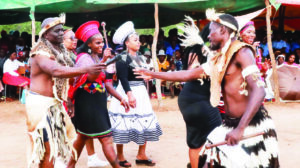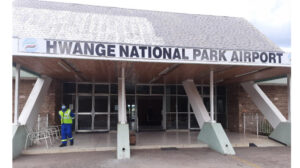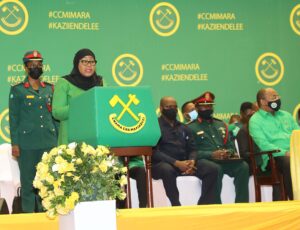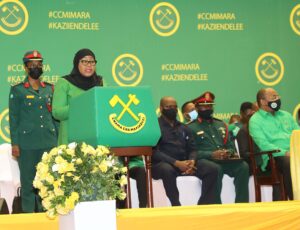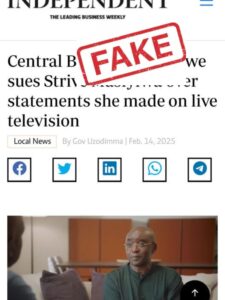Information minister Monica Mutsvangwa sat down for an interview with NewzRoom Afrika’s Cathy Mohlahlana. We fact-checked her speech. It didn’t start very well as the minister got her dates wrong. She told Mohlahlane that the interview date was ‘exactly one month before the elections’. This was not true – the election was two months away. The verdict is that her speech was a mix of truth, half truths and outright untruths:
CLAIM: I have been elected again by the people and I am coming back again as a senator.
VERDICT: False. The minister has only been nominated. The senatorial election is based on the number of votes that her party will get from the harmonised elections on 23 August 2023. According to the Electoral Act section 45(c)(5), the formula prescribed in the Eighth Schedule for the election of party-list candidates is calculated on the basis of the total number of valid votes cast for all the constituency candidates in the electoral province concerned.
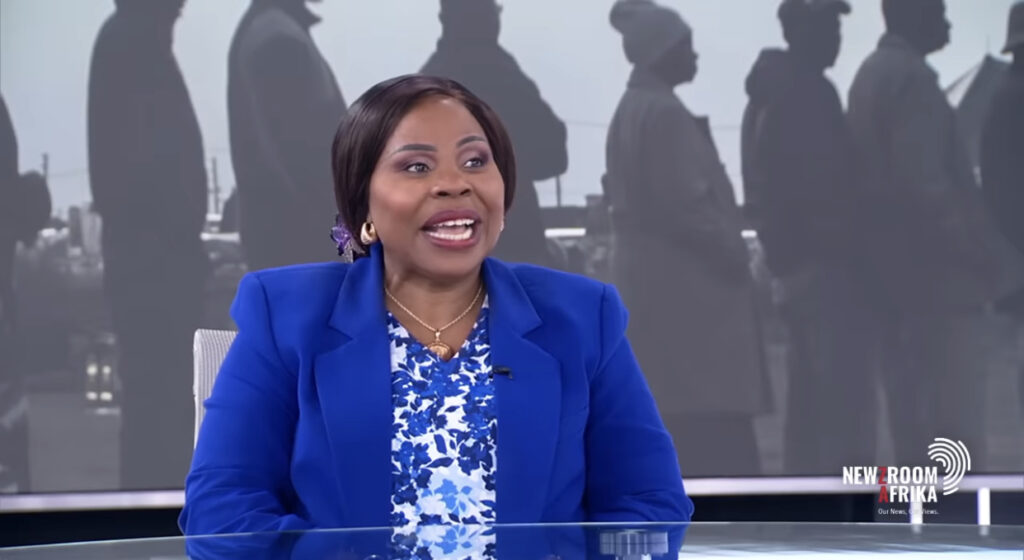
CLAIM: We haven’t heard of any report of anybody who wanted to file for presidential candidate who was unable to do it because of money.
VERDICT: False. While it may be true that the ministry hasn’t ‘heard’, reports in the public domain show that at least two candidates did not file due to money constraints. Linda Masarira failed to raise the required amount, while DUZ decided to not file for the presidential election due to ‘political financial constraints of the President and party’.
CLAIM: Where in the world do journalists cover elections without paying accreditation fees? What is happening in Zimbabwe is happening all over the world.
VERDICT: False. Accreditation fees are not a prerequisite for covering an election ‘all over the world’. For example, a journalist does not have to pay accreditation fees in neighbouring Botswana.
CLAIM: The role of the Bill (‘Patriotic’) is to make sure that you cannot go about talking bad about your country.
VERDICT: Misleading. This may be the minister’s interpretation of the bill, but it’s purpose is stated as seeking to amend the Criminal Law Code in four respects:
- It will create the crime of “wilfully damaging the sovereignty and national interest of Zimbabwe” [this is the “patriot” part of the Bill];
- It will provide mandatory minimum prison sentences for rape;
- It will alter the definition of dangerous drugs whose possession, sale and use are prohibited by Chapter VII of the Code, and
- It will narrow the scope of the crime of abuse of public office.
‘Talking bad about your country’ is not covered under these.
CLAIM: Zimbabwe is not the first country with a patriotic bill.
VERDICT: True. While the details differ, the United States of America, for instance, does have a Patriot Act. The purpose of the USA Patriot Act is to deter and punish terrorist acts in the United States and around the world, to enhance law enforcement investigatory tools, and other purposes. The Bill has also been likened to the Logan Act.
CLAIM: In terms of literacy, we are the top attested by UNESCO.
VERDICT: False. The literacy rate is defined by the percentage of the population of a given age group that can read and write. The adult literacy rate corresponds to ages 15 and above, the youth literacy rate to ages 15 to 24, and the elderly to ages 65 and above. It is typically measured according to the ability to comprehend a short simple statement on everyday life. Generally, literacy also encompasses numeracy, and measurement may incorporate a simple assessment of arithmetic ability. The literacy rate and number of literates should be distinguished from functional literacy, a more comprehensive measure of literacy assessed on a continuum in which multiple proficiency levels can be determined. The latest UNESCO Institute for Statistics ( UIS ) have Zimbabwe at 88.7 percent, Seychelles at 96 and South Africa at 95.
CLAIM: In the whole of Africa, the biggest steel company is being built in Zimbabwe.
VERDICT: False. This is a classic case of believing one’s own propaganda. Media reports have been hyping Zimbabwe’s steel plant as the largest on the continent with the potential to produce 1.2 million tons of iron and steel per annum, here and here. However, the data shows that these are misleading.
ArcelorMittal’s steel plant in Vanderbijlpark, South Africa, has an annual capacity of 1.3 million tonnes at its Blast Furnace C, and another 1.9 million tonnes at Blast Furnace D, according to the company’s financial reports, while Egypt’s Al Ezz Dekheila Steel, a subsidiary of Ezz Steel, is the largest steel manufacturing facility in Egypt, with a total capacity of 3.2 million tonnes per annum. Producing 1.2 million tonnes per year at full throttle, the Zimbabwe project would be at par with Uganda’s Tembo Steels Uganda.
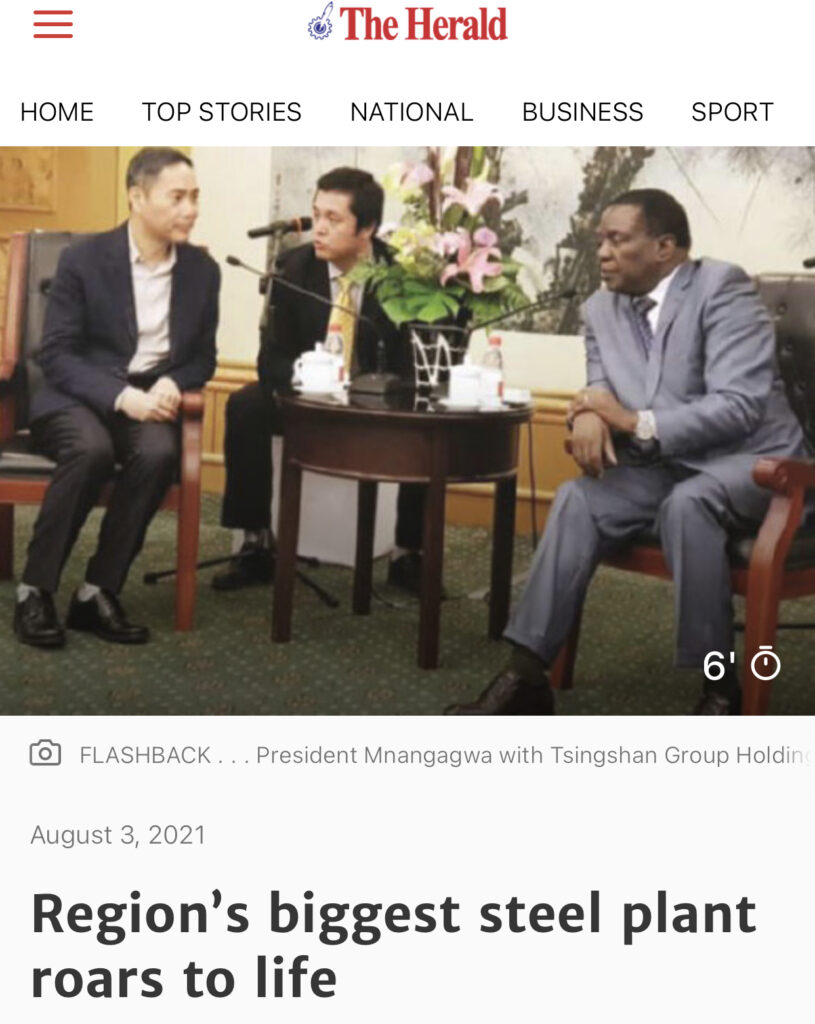
CLAIM: We have licensed 6 commercial television stations and 14 community community stations. And these are all running.
VERDICT: Partly true. The government did licence 6 commercial television stations and 14 community radio stations. However, it isn’t true that all these are running. For example, Channel D and Kumba tv stations are not yet broadcasting.
CLAIM: The electoral act right now states that our voting is polling station based.
VERDICT: True. Section 22(a)(b) of the Electoral Act states that the electoral body prepare a voters roll for each polling station area determined in terms of paragraph (a)(ii), on which roll shall be entered the names of all registered voters ordinarily resident within the area.
CLAIM: 6 million Zimbabweans are registered to vote.
VERDICT: Inconclusive. This has been rated inconclusive because the final number of people in the voters roll is yet to be published by the Zimbabwe Electoral Commission. However, the numbers are likely to be around that figure since the figure released by ZEC in May 2022 for the delimitation exercise were already at 5.8 million.
According to section 26A of the Electoral Act voters rolls are closed for the purpose of an election two days after the proclamation calling the election is published. Anyone who before that date is registered as a voter, or has lodged a claim to be registered, is entitled to have their name put on the roll and to vote in the election. ZEC is most likely to have registered at least 200 000 people between May 2022 and May 2023. Other sources put the figure at 6.1 million.
If you have any claim that you want fact checked, email us: [email protected]
